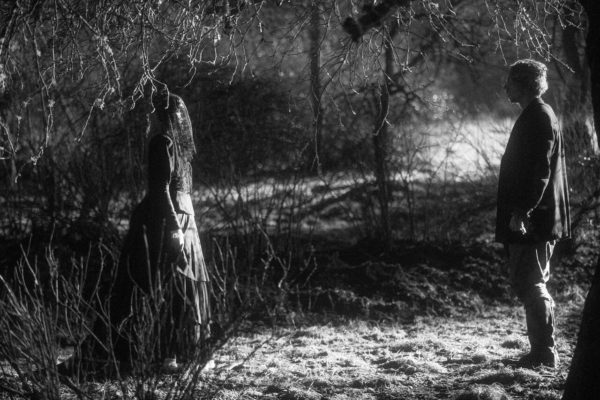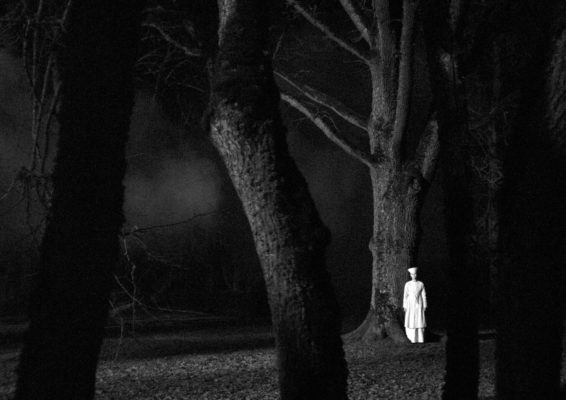
There’s something magical about November, the first official co-production between Estonia, Poland and the Netherlands and Estonia’s official entry for Best Foreign Film for the 2018 Academy Awards.
Let’s bitch it out…
Lush black and white photography.
A desolate countryside.
A sparse population of hardened, superstitious denizens trying to survive a harsh winter.
Surreal, fantastic creatures. Witchcraft. Somnambulism.
These are all elements present in Rainer Sarnet’s strange, melancholic 19th century-set fairytale/folk tale and yet that hardly begins to convey the experience of watching November. Adapted from the novel Rehepapp by Andrus Kivirahk, the film has a loose-narrative framework that organically combines the mundane and the fantastic in a decadent visual aesthetic.
At the center of November is a pair of young star-crossed lovers: peasant girl Liina (Rea Lest) and the village boy Hans (Jörgen Liik) she pines for. Unfortunately Hans is obsessively infatuated with the daughter of the German manor lord, a beauty who suffers from bouts of sleepwalking that repeatedly leave her in jeopardy of falling off the roof. The Estonian villagers who work for the German manor are destitute, starving and desperate enough to succumb to superstition and witchcraft to survive the winter. Included in this group is Liina’s father, who repeatedly tries to sell her off to a older man and resorts to theft from his neighbours using a kratt, an unholy creature comprised of wood and metal that can only be procured from a devil living in the woods in exchange for a human soul.

If you haven’t guessed it, November is an unusual film. It’s also wonderfully magnetic and hypnotic. The strange rituals and relationships of the film are deliberately kept vague or unspoken, unfurling at their own pace as the story requires. The calculated release of information lends the first half of the film a puzzle-box quality, demanding its audience pay careful attention to subtle visual and verbal cues in order to understand this strange, fantastic world.
The sumptuous black and white aesthetic reminded me of early sci-fi / fantasy genre staples such as Melies’ Trip To The Moon and Wiene’s The Cabinet of Dr Caligari with a touch of Jean Cocteau’s Beauty and the Beast and even some Val Lewton. There’s a theatricality to the set design, which vacillates between stagey and naturalistic (ironically this dichotomy is also evident in the actors: the two young leads are both professionally trained, while many of the supporting cast are real people cast for authenticity). The somber, chilly looking tone perfectly encapsulates the peasants’ dire living conditions and reinforces how vital love is for Liina and Hans’ survival.
Despite some lethargic pacing and a simple narrative, November tackles a lot of thorny issues, including the intersection of class, wealth and religion. There’s a fantastic, hilarious sequence when the threat of the plague (embodied by an extremely lively pig) drives the entire village into hysteria that begins with accusations, shifts into pleas to spare Liina and Hans’ lives, morphs into a bizarre sacrificial act wherein everyone lies down with their pants down or skirt over their heads and ends with a gorgeous slow-motion dance of joy in the snow when the town is spared.
These kinds of strange sequences are reflective of Sarnet’s interest in using the film as a bit of a morality play. The fantastic elements (the kratts, the demon in the woods, Liina’s association with witches in the hopes of securing Hans’ heart) and the mundane elements combine to critique the materialism and greed of humanity. Certainly the townspeople are trying to survive, but the costs that they’re willing to pay and the lengths that they’ll go to (often at the expense of others) is both a wry commentary and a dire condemnation. It’s no surprise then, that the film ends in an ironic, dark, beautiful fashion.
The Bottom Line: November is an exceptionally creative, fascinating film. It is an oddity that one hopes will be discovered and embraced by a loving cult audience for many years to come. It certainly captured my imagination.